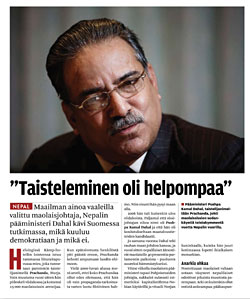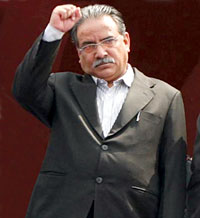Suomen Kuvalehti: How would you describe your past seven months in power? 
Pushpa Kamal Dahal: Everybody knows that we are going through a very delicate and sensitive transition period. We have many challenges, but altogether I can conclude that things are going ahead step by step, facing many twists and turns, in the process of drafting a new democratic constitution.
What would be your three main challenges?
Peace, until and unless this unique and homegrown peace process is not concluded there is always the danger of instability and anarchy. We need to take this historic peace process to its logical conclusion. The second challenge is to build a consensus between all the political parties. We have broad areas of agreement on the form of democracy, human rights, rule of law, independent judiciary and freedom of press, but there are some issues where we still need to agree: what kind of federalism we need, how power will be shared between autonomous regions, differences on the issue of form of governance. The third challenge is that the people have very high expectations from the change and we have to meet them.
In some aspects fighting the war was easier than handling the democratic governance process. But both have their own characteristics, and you can't really compare. I am fully confident that we will take the peace process forward and draft the constitution in the stipulated timeframe.
There are reports of continued intimidation, and violence is on the increase. Some of this is being blamed on your party.
I cannot agree with this statement. This is highly exaggerated. It is correct that we are having a very delicate transition period ? there are so many remnants from the previous conflict and we cannot eradicate it overnight. If you look at peace processes elsewhere in the world our peace process is much smoother. There are some unwanted activities and we are committed to punish the guilty and end impunity. In some media problems have been highly exaggerated.
What about the tensions within your own party?
To lead the revolution into a peaceful process and to hold elections and then to lead the government within a very short span of time is miraculous. But we have transformed not just our party but the whole society. Naturally there are different tendencies within my party extreme left, extreme right, vacillation tendency but overall the pragmatic more dialectic and realistic tendency is now dominant. The extremist tendency has been defeated.
If you look at the future which kind of governance model would you prefer: Korea, China or India?
I don't want to compare ourselves with anyone, but we have to learn from the negative and positive aspects of other revolutions during the 20th century. It is our conclusion that without multiparty democracy we can't serve the people and humanity. For now we have to cooperate that with other parliamentary parties.There should be no serious doubt about out commitment to multiparty democracy, freedom of press and rule of law. During the insurgency, I have praised the media and spoken out against the feudal autocracy trying to suppress the media.
But the Committee to Protect Journalists says Nepal is still one of the most dangerous places in the world for journalists and no one has been arrested.
It is unfortunate that even during the peace process a number of journalists have been killed, but it is not correct that no one has been arrested or punished. In some cases I, myself, took the initiative to capture some people to be handed over to police custody, and the case is going in the court. In one case, in the Tarai of Birendra Sah the killing was not related to our party. Recently, there was the case of Uma Singh, and here also the accused are in jail or some are underground, they were not related to any party. It was proved that this was related to property, a family dispute. It is wrong to say that nothing has been done. It is an exaggeration. The government is fully committed to end impunity.
Yourself, how Maoist are you?
(Laughs) Very interesting question. I always understood Marxism, Leninism, Maoism as a social struggle, and that conflict analysis is the soul of social science. All the great leaders of the proletariat, Marx, Engels, Lenin and Mao said that nothing should be mechanically copied from one revolution or one country. We have to analyse the situation and understand the dynamics of change. If you mechanically copy what Mao did in China then you're not a real Maoist. There are some who want to dogmatically apply what Mao did, but China itself has changed.
How about the Maoist movement in India?
Revolutions can't be exported or imported. What they do in India is solely their responsibility. There are some communist parties in India ? some are extremely left and some extremely right. When I took the path of multiparty democracy and embarked on the peace process there was serious debate within the Maoists in India about whether they should follow the Maoists in Nepal or not. There are some people in the Maoist movement in India who oppose us and say we have abandoned revolution, but there are those who say that what Prachanda is doing is correct and that we should learn from his experience.
What are your expectations with the visit to Finland?
I am fully satisfied with the trend of cooperation. There is tremendous and big change going on in Nepal and the people have high expectations. I hope that cooperation can be enhanced particularly in education and forestry, not just in conservation but also the commercial use of forests. We also expect more help and cooperation in the constitution drafting process. We would also like to encourage investment in the IT sector.
Meanwhile, back in Kathmandu
 MIN RATNA BAJRACHARYA |
* "Those trying to obstruct the peace process under the Maoist Government are criminals and murderers?they must be chased away like bhyakur."
* "The media are under the control of feudalists, capitalists and reactionary forces."
* "Big media houses are run by smugglers?they are misleading the majority of the country's population with wrong information. Since smugglers and capitalists are very active in the media sector, it will be very tough to win the war over the control of the country's media but if we move ahead with a pro-people media that fight can easily be won."


